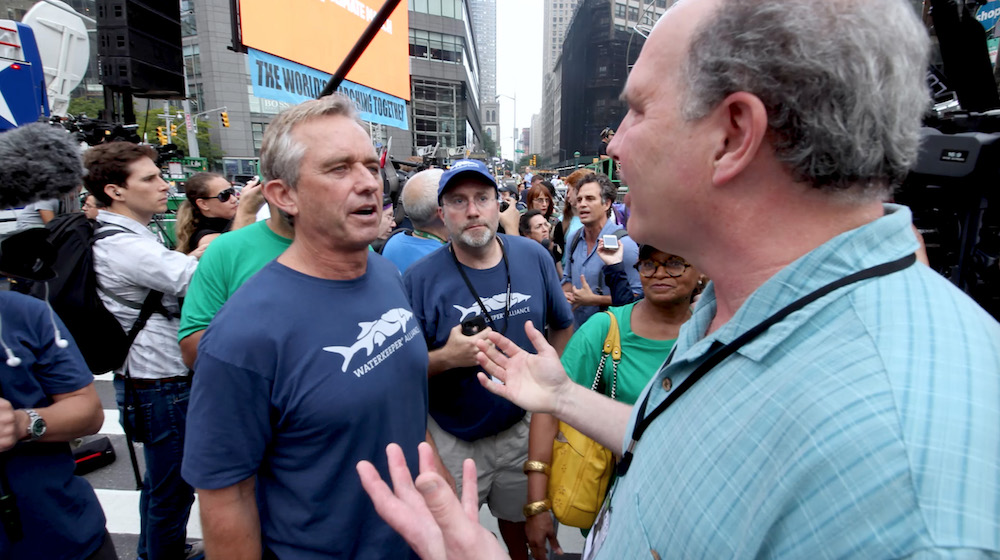‘Planet of the Humans’: Film Review
By Dennis Harvey
LOS ANGELES (Variety.com) – A flashing red light to the green power movement, “Planet of the Humans” offers disillusioning evidence that much of what’s currently promoted as renewable energy is ineffectual, wasteful and far from “clean.” Released to YouTube on the eve of Earth Day’s 50th anniversary, it’s . This debut directorial feature for executive producer Michael Moore’s longtime producer and composer Jeff Gibbs is also the first documentary project under their Rumble Media banner. Both filmmakers will host a live discussion the evening of April 22 on the doc’s YouTube channel and other platforms.
Things start off somewhat unpromisingly with Gibbs assuming the first-person perspective that’s become a cinematic nonfiction norm since “Roger & Me” 31 years ago. Moore does actually have the innate showmanship and engaging personality to pull that gambit off, as much as he’s criticized for “starring” in his documentaries. But Gibbs’ dull monotone makes him a poor narrator, and we gain very little from getting his own thumbnail biography as a born “tree hugger” before wading into the bigger issues at hand. Fortunately, “Planet” doesn’t keep him in the foreground for long, later introducing more personable collaborator-author Ozzie Zehner as a sometime fellow guide.
After a brief recap of modern environmental consciousness, we leap forward to the Obama presidency, whose recession-necessitated stimulus package included nearly $1 billion for “green energy.” But everywhere Gibbs and company look, they find “well-meaning people being misled” by supposed “clean” alternatives that provide little offset from, and in many cases are heavily dependent on, the same old “dirty” fossil fuels and other non-renewable sources. This encompasses wind and solar projects whose virtues are often wildly exaggerated, particularly in proportion to the resources required for their construction and operation.
Some of this initially feels like an unwillingness on the filmmakers’ part to admit that the path forward must involve some compromises, and success by (one hopes) gradually rising degrees. But poking past the disillusioning actual results of many such much-ballyhooed ventures, Gibbs finds reason to doubt even the good intentions theoretically at work. He’s unable to find a single corporate entity worldwide whose claims of “100% renewable” energy usage are accurate.
Meanwhile, a greenwashing surface too often hides old-school environmental destruction, polluting and profiteering from the usual billionaires. In “Planet’s” cluttered survey, there ends up being dismayingly few degrees of separation between the actions of the ostensible “good guys” (Al Gore, Sierra Club, Tesla, environmentalist Bill McKibben, etc.) and such familiar baddies as the Koch brothers, Goldman Sachs and Big Oil. Indeed, a little digging often reveals they all appear to have signed on the same dotted line.
Gibbs doesn’t give those thus indicted much chance to defend themselves; the few times he does, he cuts away before they can stop awkwardly hemming and hawing to answer a difficult question. (The final credits are interspersed with text noting that several entities here hastily reversed public positions after the film’s first screenings, though their actual policies don’t seem to have changed much.) That could get “Planet” accused of “gotcha” journalism, which combined with its somewhat overpowering content sprawl and fast-paced but hopscotching editorial organization leave the viewer with
little positive takeaway.
But that is the point, insofar as there is a clear one here: Gibbs says “the elephant in the room” isn’t climate change or any other individual factor, but humanity itself. With our species’ population having skyrocketed in the last 200 years, we are simply in denial that mankind’s needs are exhausting Earth’s resources. “Infinite growth on a finite planet is suicide,” he says, as bleak footage of rampant deforestation (in large part to supply the dubious “clean energy” source of biomass) provide just one vivid proof. There is no obvious solution, save a massive scaling-back that capitalism-driven societies don’t even want to think about.
There’s nothing particularly elegant about the way “Planet of the Humans” arrives at that downbeat thesis. Though well-shot and edited, the material here is simply too sprawling to avoid feeling crammed into one ungainly package even narrator Gibbs admits “might seem overwhelming.” Still, medicine is medicine, and if these 100 minutes leave a bitter taste, you’re still probably better off for having swallowed their dose of sobering awareness.

